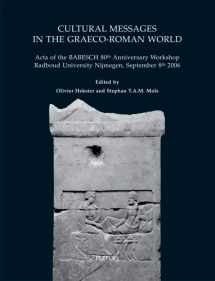
Cultural Messages in the Graeco-Roman World: Acta of the BABESCH 80th Anniversary Workshop Radboud University Nijmegen, September 8th 2006 (BABESCH Supplement)
ISBN-13:
9789042923652
ISBN-10:
9042923652
Author:
Olivier Hekster, S.T.A.M. Mols
Publication date:
2010
Publisher:
Peeters Publishers
Format:
Paperback
92 pages
Category:
Criminology
,
Social Sciences
FREE US shipping
Book details
ISBN-13:
9789042923652
ISBN-10:
9042923652
Author:
Olivier Hekster, S.T.A.M. Mols
Publication date:
2010
Publisher:
Peeters Publishers
Format:
Paperback
92 pages
Category:
Criminology
,
Social Sciences
Summary
Cultural Messages in the Graeco-Roman World: Acta of the BABESCH 80th Anniversary Workshop Radboud University Nijmegen, September 8th 2006 (BABESCH Supplement) (ISBN-13: 9789042923652 and ISBN-10: 9042923652), written by authors
Olivier Hekster, S.T.A.M. Mols, was published by Peeters Publishers in 2010.
With an overall rating of 3.8 stars, it's a notable title among other
Criminology
(Social Sciences) books. You can easily purchase or rent Cultural Messages in the Graeco-Roman World: Acta of the BABESCH 80th Anniversary Workshop Radboud University Nijmegen, September 8th 2006 (BABESCH Supplement) (Paperback) from BooksRun,
along with many other new and used
Criminology
books
and textbooks.
And, if you're looking to sell your copy, our current buyback offer is $0.3.
Description
This volume presents the outcome of the workshop 'Cultural Messages in the Graeco-Roman World', which marked the 80th anniversary of BABESCH. It takes as its premise that looking at modes to analyse cultural messages in the classical world is a valuable approach to the study of antiquity. The main purpose of the volume is therefore to explore ways in which (and the extent towards which) one can answer substantial questions about Greek and Roman culture through analysing material sources. To this end, the volume includes papers by archaeologists and ancient historians with an interest in larger methodological and theoretical questions. They all explore one of two broader themes: funerary culture and domestic culture. Within the context of those two themes, papers question how one can make statements about ancient societies based upon a specific set of material finds. The focus of the individual papers ranges from the early Greek until the later Roman period, evenly distributed among the two themes. This broad chronological range indicates the wide framework of the volume. The result is a highly interesting mixture of different kinds of studies, all emphasising the critical importance of context - local, geographical, and in terms of materiality - in any sustainable analysis of ancient cultural messages.


We would LOVE it if you could help us and other readers by reviewing the book
Book review

Congratulations! We have received your book review.
{user}
{createdAt}
by {truncated_author}


